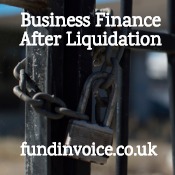- 14 Oct
Invoice Discounting Can Be Available After A Liquidation

Looking for invoice discounting? For a full overview of how it works, typical costs, and to compare options, see our Invoice Discounting page.
If your business fails, it can feel like the end of your world. What's worse is that you might struggle to get back into business, as traditional lenders don't want to support your new venture. Even if you have had a previous company enter insolvency, such as a compulsory liquidation, you may still be able to get funding if you decide to start a new company. Everyone deserves a second chance.
Invoice Discounting After Winding Up
We had a case recently where a director's previous company had gone into liquidation and been wound up, following a winding-up petition from a creditor. To most people, this would appear to be the type of previous credit history that would prohibit you from getting any business finance against a future venture, especially an invoice discounting facility. However, FundInvoice were able to find the company a disclosed invoice discounting facility, from a flexible invoice discounter, that was prepared to fund the new venture on the strength of the book debts, rather than the director's previous trading track record.
Traditional lenders may well turn down such an application because of the track record. However, an invoice discounter focuses on the value in your sales ledger, rather than just your financial track record. This means that prime movers with previous business failures may still qualify for this type of business finance, even though traditional lending may not be available to them.
Disclosed Invoice Discounting
With disclosed invoice discounting (DID), you get to continue to maintain your sales ledger and chase up your own customers for payment. Some companies prefer this to factoring as they like to keep control of all contact with their customers, or they find that the cost of outsourcing their credit control is expensive, as they have a large number of customers, all with small balances outstanding. The disclosed nature of DID means that whilst you get to continue to undertake the customer contact, the customers are aware of the involvement of the discounter. This gives the invoice discounting company the additional comfort of being more flexible in providing funding.
DID can be a good compromise if you would prefer not to use factoring, but don't qualify for confidential invoice discounting (funding only where customers are not aware of the involvement of the funder). All the various product options are explained in our free guide to the different types of invoice discounting.
- Home
- Business Financing
- Invoice Finance
- Invoice Discounting
- Factoring
- Debt Factoring
- Recourse Factoring
- Fund Selected Invoices
- Business Loans
- Construction Sector Funding
- Protect Against Bad Debts
- Exports Collection And Funding
- Import Funding
- Body Shop Funding
- Spot Factoring
- Retail Sector Funding
- Fund Invoices Confidentially
- Help Running Your Payroll
- CHOCs Customer Handles Own Collections
- Collect Invoices Confidentially And Funding
- Outsourcing Your Credit Control
- Asset Finance And Mortgages
- Case Studies
- About Us
- Testimonials
- Find Out More
- News
- Free Magazine
- Blog






